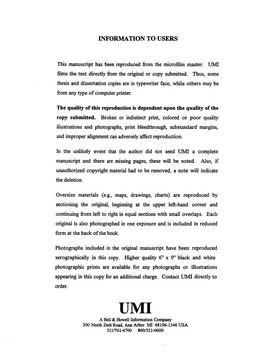| dc.contributor.advisor | Greene, Barbara, | en_US |
| dc.contributor.author | Gladney, Lawana Shirelle. | en_US |
| dc.date.accessioned | 2013-08-16T12:30:02Z | |
| dc.date.available | 2013-08-16T12:30:02Z | |
| dc.date.issued | 1998 | en_US |
| dc.identifier.uri | https://hdl.handle.net/11244/5640 | |
| dc.description.abstract | This study examined the relationships among measures of fictive kinship, racial identity, attitudes towards school, influence of peers, and future goals and achievement among African American high school students. The study also examined how fictive kinship, racial identity, influence of peers, and attitudes toward school predict achievement; and how racial identity, perceptions of fictive kinship, influence of peers, and attitudes toward school predict future goals; and how racial identity, perceptions of fictive kinship, influence of peers, and future goals predict attitudes toward school. Previous research has found that African American adolescents achieve at lower levels than other racial groups, but few studies have investigated their desire to achieve. An examination of racial identity in African American students will help provide an understanding of fictive kinship, group identity, and peer influences that are unique within the African American community and the potential effects that it may have on the achievement of African American students. | en_US |
| dc.description.abstract | The sample consisted of 270 African American high school students in grades nine through twelve. The sample of students was drawn from three urban high schools in a public school district in the mid-South. The students were enrolled in History and English classes. Results of the study indicated that racial identity was correlated with fictive kinship, attitudes towards school, peer influence, future goals, and achievement thus, playing a major role in the lives of African American students. The study also found that fictive kinship exists among African American adolescents, and that attitudes towards school, racial identity and future goals are the strongest predictors of achievement. Findings related to racial identity and fictive kinship warrant further investigation of the roles of these variables as they relate to achievement. Suggestions for future research and implications of these findings are discussed. | en_US |
| dc.format.extent | xi, 133 leaves ; | en_US |
| dc.subject | Education, Secondary. | en_US |
| dc.subject | Black Studies. | en_US |
| dc.subject | Sociology, Ethnic and Racial Studies. | en_US |
| dc.subject | African American students Race identifity. | en_US |
| dc.subject | Education, Educational Psychology. | en_US |
| dc.subject | African American students Attitudes. | en_US |
| dc.title | Fictive kinship, racial identity, peer influence, attitudes toward school, and future goals: Relationships with achievement for African-American high school students. | en_US |
| dc.type | Thesis | en_US |
| dc.thesis.degree | Ph.D. | en_US |
| dc.thesis.degreeDiscipline | Department of Educational Psychology | en_US |
| dc.note | Source: Dissertation Abstracts International, Volume: 59-04, Section: A, page: 1066. | en_US |
| dc.note | Adviser: Barbara Greene. | en_US |
| ou.identifier | (UMI)AAI9828793 | en_US |
| ou.group | Jeannine Rainbolt College of Education::Department of Educational Psychology | |
